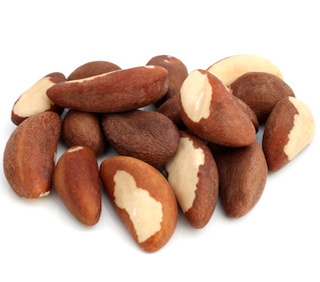 Brazil Nuts.
Brazil Nuts.
Brazil nuts are native to South America, and their trees grow mostly around the riverbanks of this continent's tropical rainforests.
Like many other nuts, Brazils are very popular for their high content of healthy fats.
According to USDA Nutrient Database, at least 66% of the content of Brazil nuts is made up of fats - saturated, mono-unsaturated and poly-unsaturated. We know that healthy fats are important for the function of our immune and cardiovascular systems, among many other benefits.
These nuts also contain 14% of protein, with a whole variety of essential amino acids. And, of course, they also offer a number of vitamins and minerals: B-complex, vitamin E, calcium, magnesium, iron, zinc, selenium and a lot more. (Ref. 1)
It is interesting to note that Brazil nuts contain an unusually high concentration of selenium - they are possibly its richest dietary source, as compared to other foods. Selenium has been associated with protection against tumour development in laboratory animals. (Ref. 2)
Written by: Irina Bright
Original publication date: 2013
Updates: 2020
Republication date: 2020
References.
1. USDA Agricultural Research Service, National Agricultural Library, Nutrient Data Laboratory (2013). Retrieved February 13, 2013 from: https://ndb.nal.usda.gov/ndb/foods/show/3621
and
Brazil nut. (February 4, 2013). In Wikipedia, The Free Encyclopedia. Retrieved February 13, 2013 from https://en.wikipedia.org/w/index.php?title=Brazil_nut&oldid=536450188
2. Jacqueline C. Chang, Walter H. Gutenmann, Charlotte M. Reid and Donald J. Lisk (1995). Selenium Content of Brazil Nuts from Two Geographic Locations in Brazil. Chemosphere, Vol. 30, No. 4, pp. 801-802, 1995. Retrieved February 13, 2013 from: https://www.iodine4health.com/research/chang_1995_selenium_content_of_brazil_nuts.pdf